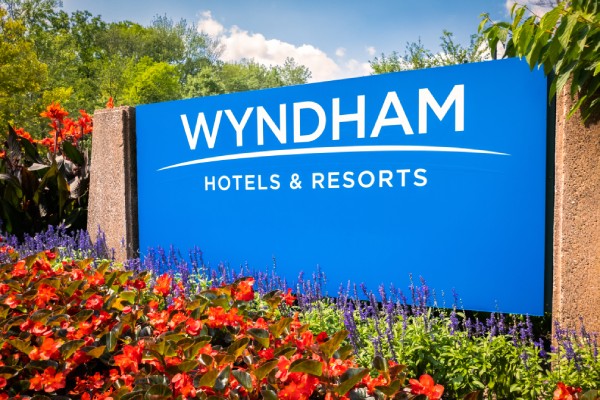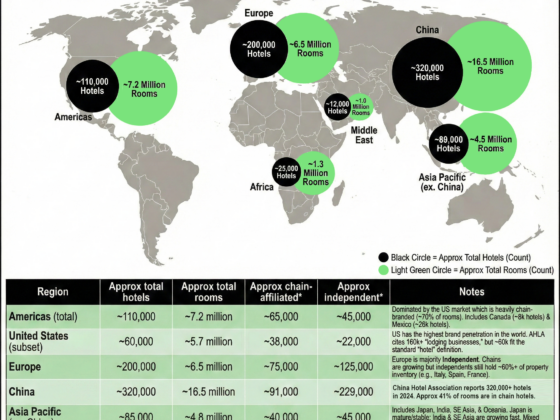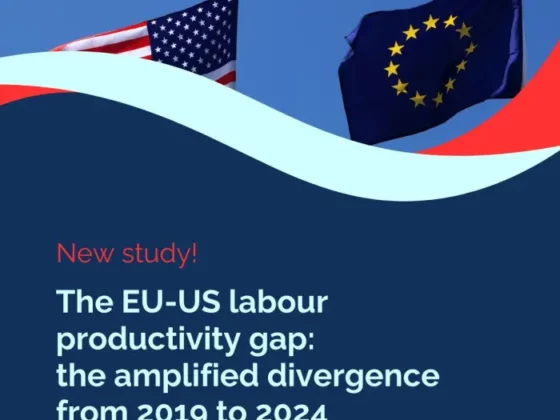
Not five minutes into Wyndham Hotels & Resorts’ first-quarter earnings call, CEO Geoff Ballotti invoked 9/11, the global financial crisis and the COVID pandemic. It’s not confident imagery, but Ballotti was using it to explain and support his opinion that a company like Wyndham, which is heavily embedded in the select-service and economy segments, is well-suited and well-prepared to deal with any slowdown in the global economy, a sober reality after Q1 U.S. GDP contracted.
“Following 9/11, RevPAR for our select-service hotels outperformed STR’s upscale-and-above segments by 300 basis points; during the global financial crisis by 500 basis points; and during COVID by 2,500 basis points,” Ballotti reminded analysts on the call. “[Our] track record of industry outperformance is not coincidental. It reflects the structural advantages of our model and the nature of the demand that we serve with limited reliance on white-collar, corporate and group travel, which tend to contract most during economic downturns. Our business is anchored by a stable and resilient base of essential frontline blue collar workers, a guest segment that continues to drive consistent demand, even as broader corporate discretionary travel budgets tighten.”
Despite Wyndham’s resiliency amid economic tumult, the franchisor guided its full-year 2025 RevPAR down to a range of down 2% to up 1%. As Ballotti alluded to, U.S. RevPAR began strong toward the beginning of the year, but soured in February and March as consumer sentiment weakened. “Our results finished about three points below our expectations,” he said.
Added CFO Michele Allen, “It’s consumer sentiment resulting from the macro uncertainty that’s weighing on the overall leisure occupancy. If we think about the remainder of the year, in the U.S., specifically, we’re expecting at the low end that the rest of the year will perform consistent with the normalized trends we saw in March and April.
Wyndham’s global RevPAR grew 2% for the quarter, but turned negative in China, down 8% year-over-year. Ballotti, however, remains bullish: “Recent trends are now more encouraging, indicating positive momentum as we head into the busy summer travel months,” he said.
The bulk of Wyndham’s travel demand and business is domestic; it’s far less impacted by international inbounds, which account for less than 3% of Wyndham’s bookings in the U.S., inclusive of Canada. Approximately 90% of Wyndham’s footprint is concentrated in driving markets, where, as Ballotti pointed out, leisure demand is “less impacted by the cost and the complexity of air travel.” Booking patterns are continuing on a normal pace, Ballotti said, with average lead times holding steady at 20 nights and average length of stay still well ahead of where they were pre-COVID level. Cancellation rates, he said, are also not abnormal.
“On the transient side, our middle-income guests are still more employed with wages and with savings higher than pre-COVID and nearly half of all Americans are still saying that they’re planning a vacation for this summer,” Ballotti said.
Meanwhile, despite Wyndham’s concentration of product in lower chain scales, which Ballotti said were more insulated from economic whipsaw, the company continues to push development into higher-rated markets and assets. “As we prioritize our development growth in higher-fee-par geographies and higher chain scales, the hotels we are adding are entering the system with stronger economics contributing to meaningful royalty rate accretion,” he said.
As the broader hotel industry leaned into conversion during and post-COVID, Wyndham is now seeing a normalization in new construction, ticking up by 500 basis points, both domestically and internationally, to nearly a third of all Wyndham openings.
In the quarter, adjusted EBITDA grew 9% on a comparable basis and Wyndham grew its global system by 4% and its pipeline by 5% to a record 2,143 hotels.
Ballotti addressed the impact of tariffs specifically related to construction and its attendant costs. On the positive side, as he explained, most Wyndham-branded product is built with lumber, so-called stick construction. So while there has been a lot made of tariffs on steel and aluminum, the Trump administration exempted Canadian lumber from the new tariffs.
Tariff impact on the supply chain has become a large consideration for hotel companies. Wyndham is increasingly sourcing domestically when possible to avoid tariff harm. “In fact,” Ballotti said, “we’re mandating at least one domestic sourcing solution for all important supply categories.” For example, sourcing for Wyndham’s new Days Inn prototype, Dawn, is entirely from North Carolina or Texas; for Echo Suites, Wyndham’s fastest-growing new construction brand, FF&E is sourced and manufactured in Minnesota.
Then there is infrastructure—a key component of the Biden administration to upgrade the country’s flailing bridges, tunnels, highways and more. The aspiration is for it to carry over. For Wyndham, the rebuilding of America drives workers and their tool belts to Wyndham properties. Ballotti said there was a slowdown in infrastructure disbursements in the first quarter, prompting a meeting he and other travel CEOs had recently with Transportation Secretary Sean Duffy with the express focus over getting the balance of the allocations out. “The administration wants faster spending on highway and bridge construction,” what Ballotti, perhaps imitating the current president, referred to as “big, beautiful highways and big, beautiful bridges.”







